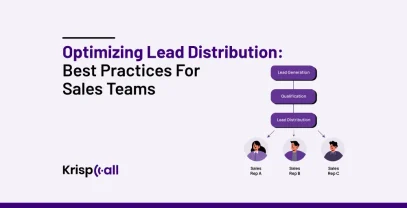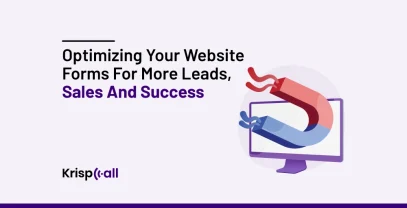As a company owner, have you ever considered tracking every detail of your business? 📈 To assist you with tracking, you can purchase various sales tracking software tools according to your business needs.
Sales tracking software is a tool that assists businesses in managing and improving their sales processes. Also, Did you know the sales performance management software market is expected to be worth more than USD 16.3 billion by 2032, with a CAGR of 11.6%? 💭
However, before selecting a tracking tool for your business, you need to know some basic things, such as what sales tracking software is, what to consider, and what good tracking software consists of.
To know all those in detail, let’s delve into this blog post and learn about your business’s sales tracking software tools in 2024.
🔑 KEY HIGHLIGHTS:
- Sales tracking software helps businesses monitor, analyze, and improve sales processes, leading to increased sales and improved efficiency.
- Zendesk Sell, NetSuite CRM, FreeAgent CRM, SalesNOW, Spiro, and Freshsales are some of the best Sales Tracking Tools in 2024.
- When choosing the best sales-tracking software, consider features, usability, budget, integration, and security.
- Pipeline Management, Activity Management, and Reporting & Analytics are the key features that sales tracking software should consist of.
What is Sales Tracking Software?

Sales tracking software is a tool that helps businesses monitor, analyze, and improve their sales processes. It serves as a virtual assistant for salespersons by keeping records of all the interactions and activities that lead to closed sales. Simply put, it records your current sales activities and provides insights into what you can anticipate in future sales.
Sales tracking software will help you improve your visibility and accountability, boost your sales productivity, improve customer relationships, and give you a competitive advantage over other businesses.
The main benefits include the enhanced capacity for making decisions based on big data and analytics, higher sales rates and revenues, and improved comprehension of customers’ pathways and sales funnels.
What does a good sales tracking software consist of?
A good sales tracking software, or CRM, can help your sales team manage leads, visualize pipelines, track communication, automate tasks, and provide insightful reports. This lets you focus on closing deals while gathering valuable data to improve your sales strategy.
A good sales tracking software should include the following key features:
1. Pipeline Management:
With this feature, you can use prospect and lead generation tools to identify potential customers and build a prospect database. It also helps you score and qualify leads to determine who will most likely make a purchase.
Likewise, presentation and pitching tools help you, with sales representatives, deliver a consistent, thorough, and engaging pitch to the client. This management allows you to use objection handling and conversion tools to navigate customer concerns and close deals as quickly as possible.
2. Activity Management:
Another essential feature is activity management, as it helps you track sales calls to gather data on which phone conversations are most effective at moving prospects through the pipeline.
Likewise, sales email tracking allows you to analyze which email strategies attract paying customers. Your business can grow by automating events, tasks, calls, and emails to streamline the sales process.
3. Reporting and Analytics:
With reporting and analytics, you and your business team members can visualize the sales funnel to see where leads are in the process. Likewise, it allows you to track the sales team’s performance and productivity.
Similarly, this feature offers you and your business powerful reporting capabilities to generate analytical reports for managing the business and insights into successful sales techniques and areas for improvement.
In addition to the features mentioned above, good sales tracking software also helps manage the entire sales cycle from lead to close, maintain a history of interactions with prospects and customers, smooth workflow processes for scheduling activities, to-dos, and follow-ups, and interactive sales funnel to identify opportunities at each stage of the cycle.
10 Best Sales Tracking Tools in 2024
Several sales tracking tools can help your business monitor the basic details of its sales, marketing, and other activities. Different tracking tools offer different features according to your needs, but the pricing plans vary.
So below is the comparison table of the 10 best sales tracking tools based on the features:
| Features | Lead Management | Pipeline Management | Communication Tracking | Reporting & Analytics | Integration |
| Salesforce Sales Cloud | ✓ | ✓ | ✓ | ✓ (advanced) | ✓ (extensive) |
| HubSpot Sales Hub | ✓ | ✓ | ✓ | ✓ | ✓ |
| Zoho CRM | ✓ | ✓ | ✓ | ✓ | ✓ |
| Pipedrive | ✓ | ✓ (visual) | ✓ | ✓ | ✓ |
| Freshsales | ✓ | ✓ | ✓ | ✓ | ✓ |
| Spiro | ✓ | Limited | ✓ | Limited | Limited |
| SalesNOW | ✓ | ✓ | ✓ | ✓ | ✓ |
| FreeAgent CRM | ✓ | ✓ (basic) | ✓ | ✓ (basic) | ✓ |
| NetSuite CRM | ✓ | ✓ (advanced) | ✓ | ✓ | ✓ |
| Zendesk Sell | ✓ | ✓ | ✓ | ✓ | ✓ |
1. Zendesk Sell
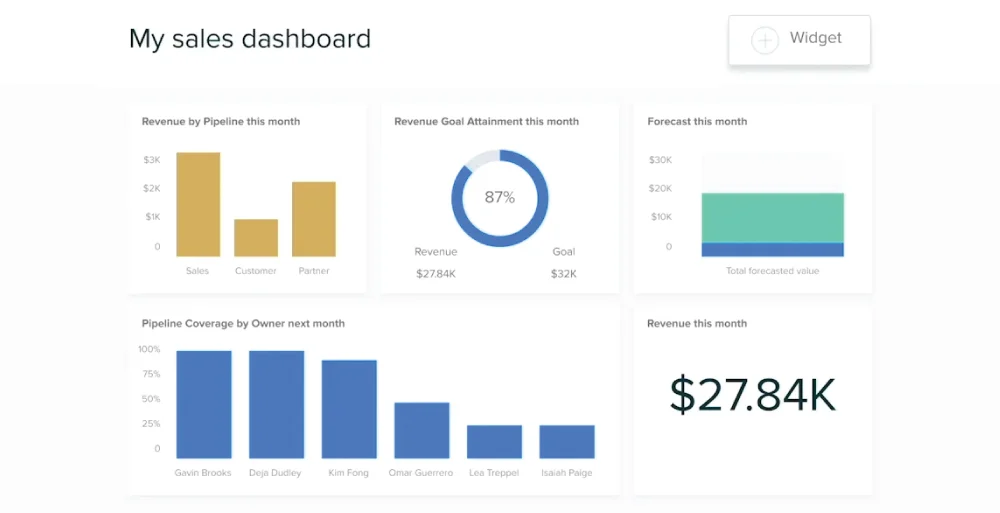
Zendesk Sell is a modern sales tracking CRM suitable for small businesses and enterprises. Zendesk’s advanced sales automation allows you to track leads, analyze sales reports, manage contacts, and optimize your sales strategies. Zendesk’s powerful, simplified features make performing and managing daily workflows easier.
Likewise, You can easily integrate your CRM sales tracking app with other business applications. Then, Your teams will perfectly sync with a single central data location without switching screens.
Features:
- Lead capture and management
- Visual sales pipeline for deal tracking
- Communication tracking of emails and calls
- Sales automation for repetitive tasks
Pros:
- Easy to use.
- Affordable pricing.
- Offers Core CRM features.
- Better Mobile Accessibility.
- Integration with Zendesk products.
Cons:
- Limited Advanced Features.
- Weaker Customer Service.
- Scalability Concerns.
2. NetSuite CRM
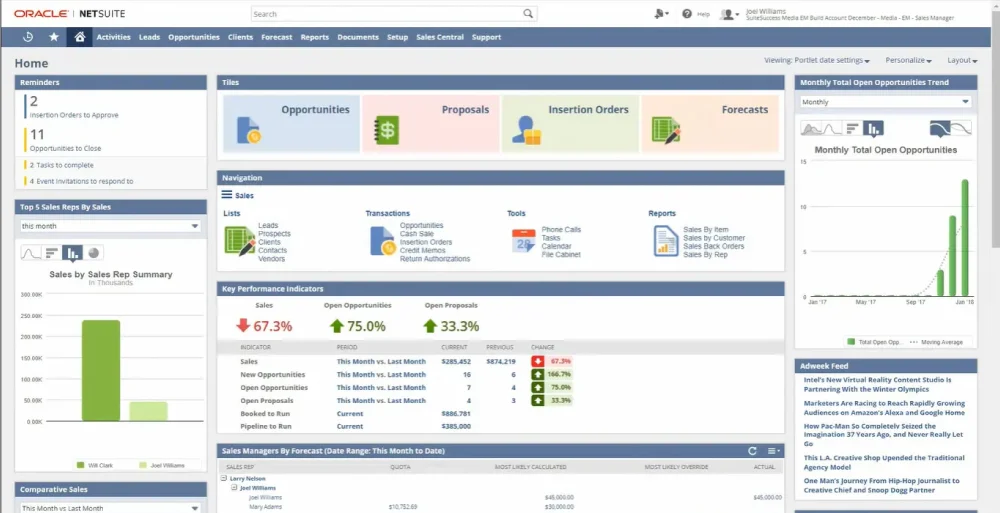
NetSuite CRM is a cloud-based solution for sale that notably supports small to medium-sized businesses. It offers one-on-one customer service through its rep, available 24/7, and a live instruction feature. The quota management and sales forecasting feature of NetSuite CRM can categorize various kinds of transactions to select quotes, projections, and opportunities.
Also, real-time dashboards produce role-based reports to guide interactions with the customer service, marketing, and sales departments. NetSuite CRM is a more extensive cloud-based tool that includes functionality for monitoring sales performance, orders, and partners.
Features:
- Comprehensive CRM features
- Strong Reporting & Analytics
- Integrated E-commerce
- Partner Relationship Management
Pros:
- All-in-One Solution.
- Offers Scalability.
- Provides Real-Time Data.
- Strong Financial Management
Cons:
- For new users, its interface may be complex to use.
- Pricing costs can be high for small businesses.
- After purchasing the plan, the implementation time of this software can take a certain time.
3. FreeAgent CRM
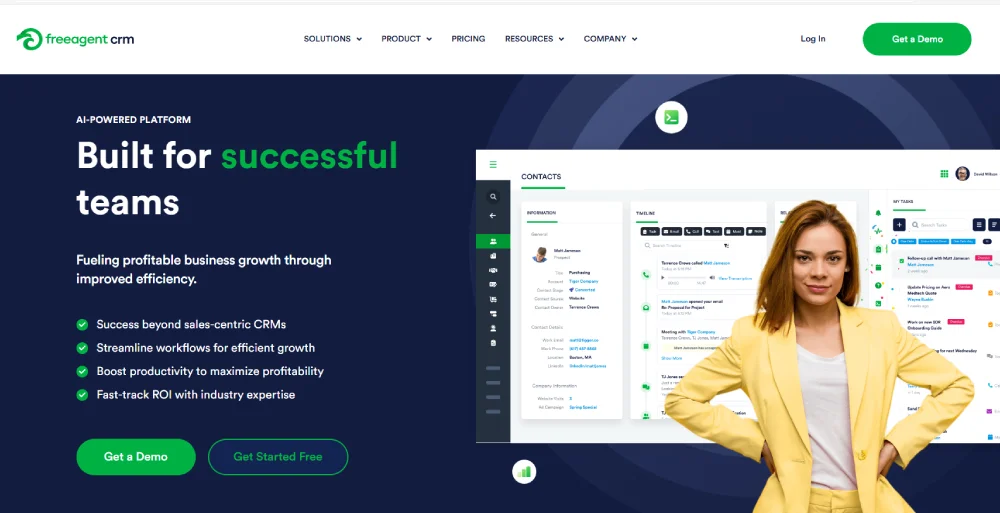
FreeAgent CRM is known as one of the best sales tracking tools. It is an automation system that provides sales tracking features with customer relationship management tools. It has many features, including volunteer management, expense tracking, and drip emailing.
This CRM software uses boards, lists, and cards to help teams intercommunicate visually and deliver real-time reports that precisely forecast differences in individual activities.
Features:
- Lead capture & management
- Pipeline management
- Communication tracking
- Sales automation (basic)
Pros:
- Affordable & easy-to-use.
- Good fit for small teams & startups.
- Integrates with popular tools (Zapier).
Cons:
- Limited advanced features (forecasting, gamification).
- Less stable reporting & analytics.
4. SalesNOW
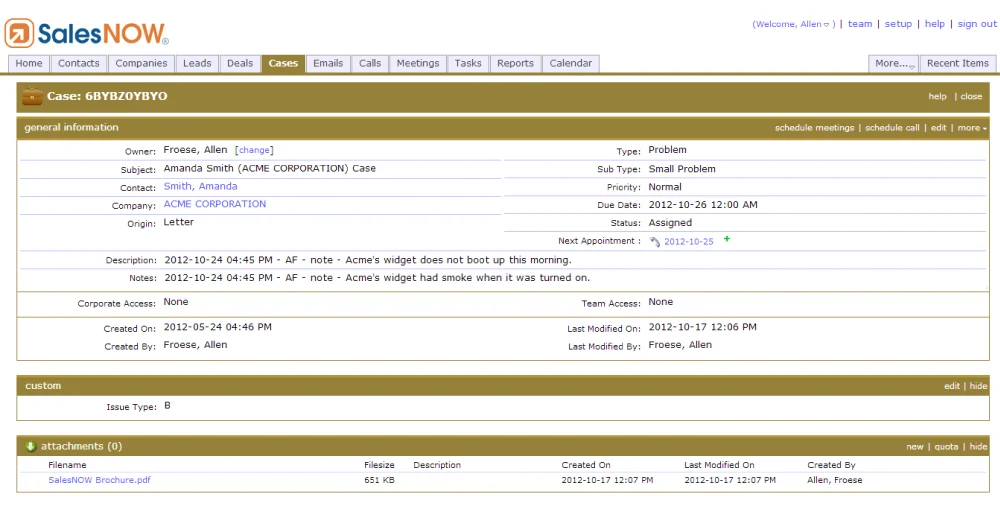
SalesNOW is another well-known cloud-based sales CRM that works on mobile and desktop devices. SalesNOW provides field sales management and mobile access to agents working outside the office. SalesNOW is user-friendly because it is accessible via most mobile phones or tablets.
Its mobile CRM contains all of the same features as the online platform and is compatible with iOS, Android, and BlackBerry. SalesNOW provides a customizable lead tracking system that allows easy follow-up with your leads and automated tools that organize and assign them to the right sales rep.
Features:
- Email marketing
- Lead distribution
- Prospecting tools
- Performance metrics
Pros:
- Affordable & user-friendly.
- Strong value for small sales teams.
- Easy pipeline visualization.
Cons:
- Limited reporting & analytics.
- Lacks advanced features like sales forecasting.
5. Spiro
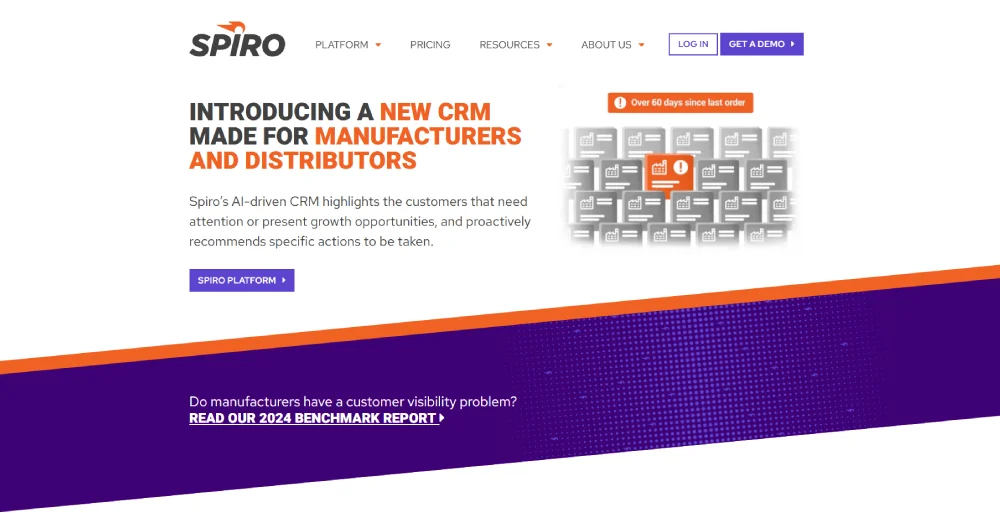
Spiro is a sales tracking CRM tool developed for B2B companies in the manufacturing, finance, and insurance industries. Its AI engine is designed to operate in the background, automatically collecting data from email, voice, and text to track engagement across the sales cycle.
Spiro’s interface streamlines pipeline management and allows you to drag and drop input deals across sales stages to track where each deal is in the sales cycle. Spiro integrates with various tools, including Microsoft Office 365, Zendesk, NetSuite ERP, QuickBooks, Slack, and Zoom. It is also compatible with HubSpot features such as contact activity and management, email marketing, and contact and company insights.
Features:
- Calendar/reminder system
- Sales forecasting
- Referral tracking
- Lead management
Pros:
- Focuses on lead quality with AI scoring.
- User-friendly interface.
- Integrates with popular tools.
Cons:
- Limited sales automation features.
- It may not be ideal for complex sales processes.
6. Salesdash
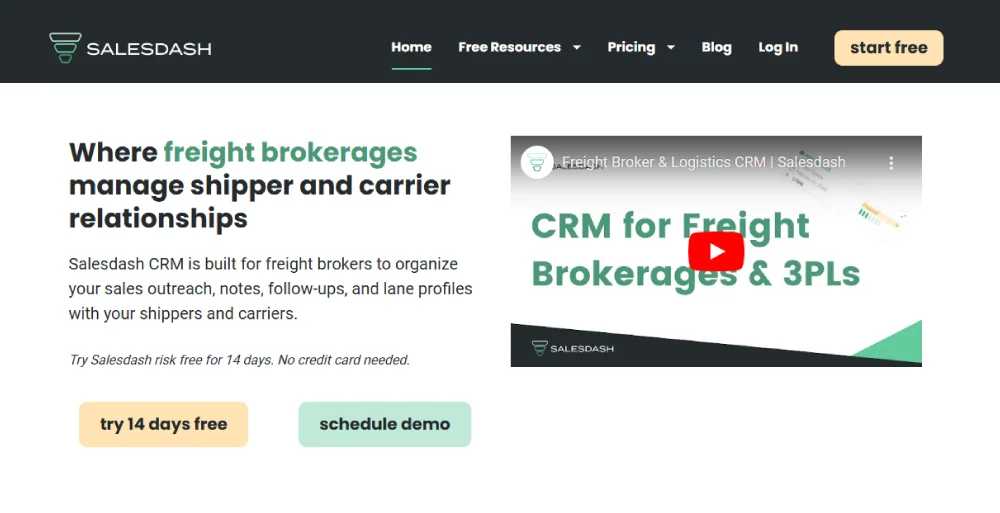
Salesdash is a simple and easy-to-use CRM that allows you to create or import contact information to track customer activity. You can set reminders manually or have the software do it for you. Salesdash allows you to manage pipelines by creating custom pipeline stages depending on your preferred customer journey.
You can track clients throughout the purchasing process and create and customize as many funnels as you need. Salesdash’s feature of infinite custom fields allows you to add as much client data as required. This enables you to generate comprehensive reports on your contacts, clients, and accounts.
Moreover, Salesdash boasts integrations with Google and Outlook, allowing you to sync your email and/or calendar to the software, enhancing its functionality and usability.
Features:
- CRM
- Mobile access
- Calendar/reminder system
- Forecasting
- Task management
Pros:
- Excellent visual pipeline for deal tracking.
- Affordable & easy-to-use.
Cons:
- Limited features compared to some competitors.
- Lacks advanced reporting & analytics.
7. Thryv
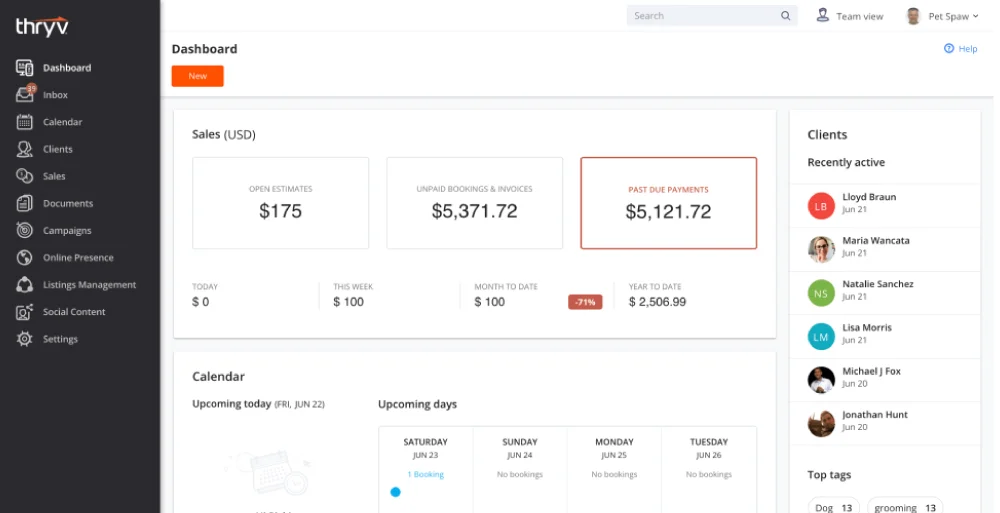
Thryv is an appointment-scheduling sales app with numerous features, including two-way messaging, room booking, mobile payments, and tax calculations. Thryv, also known as Google Premier Partner, allows you to offer customers service packages to secure appointments and increase sales.
Furthermore, Thryv, as a sales tracking tool, allows you to create a custom review request URL to share with customers to generate more reviews and help your company. Thryv offers a unified customer message inbox, consolidating all communications in one place. It also features automated reminder settings to help you maintain regular and timely interactions with your leads.
Additionally, Thryv provides the capability to create and offer customer service packages, intending to secure appointments and generate advance sales.
Features:
- Analytics/ROI tracking
- Automated scheduling
- Marketing automation
- Emailing marketing
- Billing Portal
Pros:
- All-in-one solution for small businesses.
- Integrates CRM & marketing tools.
- Manages client communication & appointments..
Cons:
- CRM features might not be as robust as dedicated CRMs.
- It may be overwhelming for businesses with more straightforward needs.
8. Keap
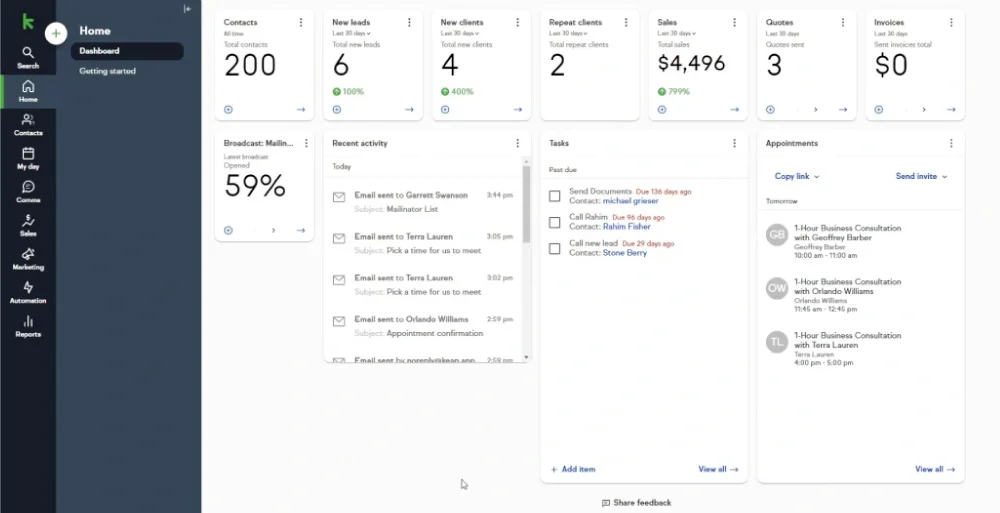
Keap is a web-based sales activity tracker with mobile functionality and live instruction for new users. Keap provides a wide range of simple to advanced automation, allowing you to choose and customize the automation.
Likewise, Keap enables users to automate follow-up processes, including sending bulk SMS/texts and emails to potential clients. You can also use Keap Business Line to generate a unique company phone number for lead conversations.
Keap offers seamless integrations with over 2,000 third-party applications, enabling you to consolidate your existing tools and programs into a unified CRM platform. This allows you to centralize all your data in one convenient location, accessible from both desktop browsers and Keap’s mobile app.
Features:
- Powerful lead capture & nurturing
- Sales automation & workflows
- Marketing automation tools (email, landing pages)
- Live Chat
Pros:
- Extensive marketing automation capabilities.
- Manages the entire customer lifecycle.
- Integrates CRM, marketing & e-commerce.
Cons:
- It can be complex for non-technical users.
- Higher pricing compared to some CRMs.
9. Skynamo
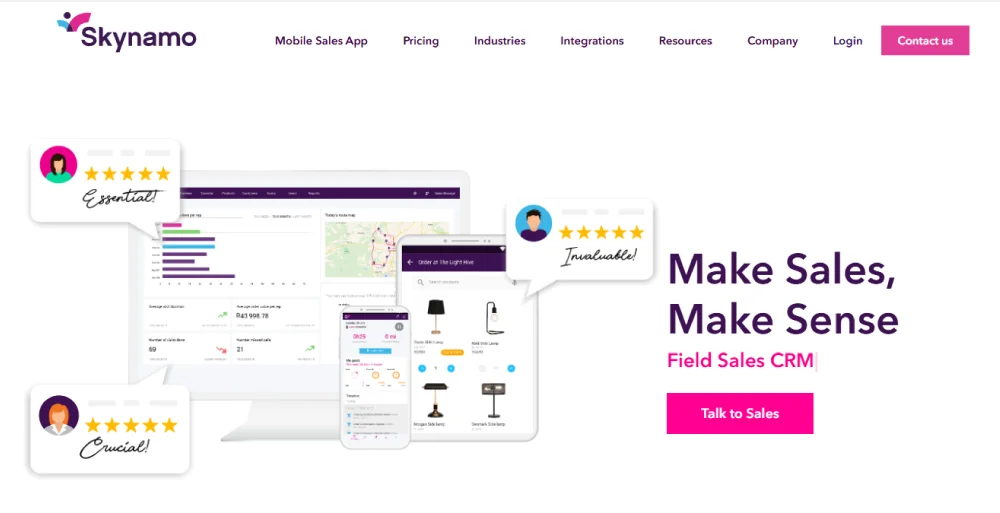
Skynamo is a cloud-based solution for tracking and managing sales specifically designed for manufacturers, wholesalers, and distributors. On its website, the platform is identified as a field sales application. Skynamo offers real-time reporting and automated sales analysis, enabling monitoring of retail activity, sales tasks, orders, projected sales, customer visits, and other field-related information.
Additionally, Skynamo supports integration with resource planning and accounting software through a selection of integration partners, including Sage, Acumatica, Xero, Microsoft Dynamics 365, BigCommerce Partner, Syspro, and QuickBooks.
Features:
- Call Management
- Document Storage
- Forecasting
- Project management tools
Pros:
- Integrates CRM with project management.
- Suitable for businesses with project-based sales.
- Offers marketing automation tools.
Cons:
- The user interface might be less intuitive.
- Limited reporting & analytics compared to some CRMs.
10. Bitrix24
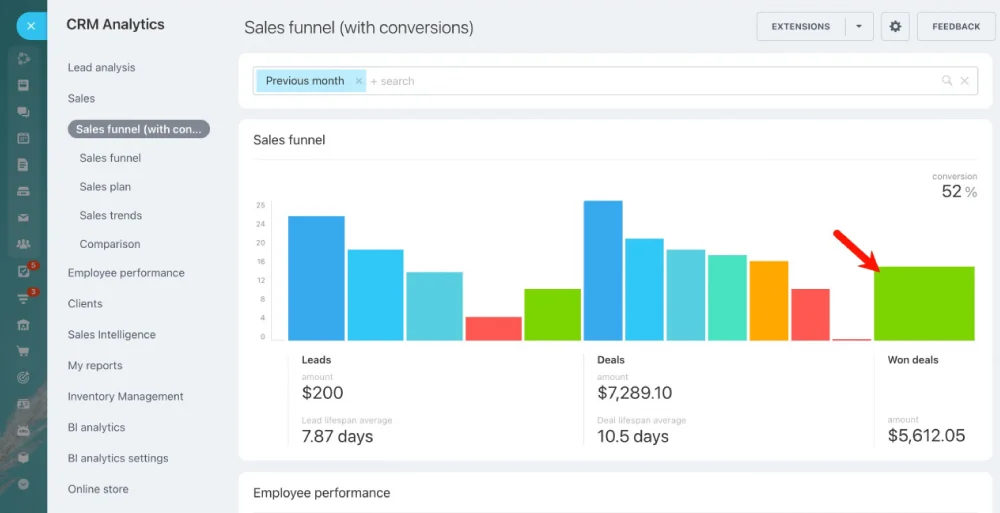
Bitrix24 is a software platform for sales call tracking that sustains both large and small businesses. Its goal is to establish a virtual workspace for your company, enabling collaboration among agents regardless of location. It offers HD video calls and conferences for up to 48 participants without any time restrictions. It also allows call recording and customization of video chat backgrounds.
Moreover, Bitrix24 enables project activity monitoring, work report reception, and company workload distribution. It provides various visual project management tools, including printable Gantt charts and adjustable board layouts.
Features:
- Sales Analytics
- File Sharing
- Built-in communication channels (chat, social)
- Mobile app
Pros:
- All-in-one solution with CRM, project management, and communication.
- Free plan with limited features.
- Good fit for companies needing collaboration tools.
Cons:
- Steep learning curve due to extensive features.
- A free plan might not be sufficient for complex needs.
- Customization can be complex.
What are Things to Consider When Choosing the Right Sales Tracker Tools?
There are a few things you need to consider when choosing the right sales tracker tools for your business, and some of them are:
- Needs and Goals: First, you must realize your business goals using a sales tracker. Suppose you want to improve sales pipeline management, increase lead conversion rates, or gain more customer insights. In that case, you must identify your business goals to help you prioritize the features you need.
- Features: You can look for a tracker with features like lead management, sales pipeline visualization, and reporting. Also, consider whether your business needs features like sales forecasting, automation tools, or integrations with other business software. You can pick the best sales tracking tool for your business according to your needs.
- Usability: When using software, you and your customer must feel it is easy to use with a user-friendly interface. So, when choosing a sales tracking tool, it must be simple for your team to adopt. However, complex interface tools can lead to low usage and reduce the benefits.
- Budget: It is also essential to mention that there are several types of sales trackers, and these have distinctive pricing options that you can use depending on the business model that you have chosen. Some are free services, the free trial restricted with limited features, paid services, and usage billed services.
- Integration: How well do you find the sales tracker compatible when integrating with other software that you use in your business? You can select tracking tools with more integration with other CRM platforms to help your business grow and contribute to the alignment of several processes and general efficiency.
- Security: To properly protect customer information, the sales tracker must still employ sufficient security measures. Some functions, including data encryption and access restriction, can be implemented to achieve a higher security level for the data.
- Customer Support: While using any software or tools, you might face issues regarding the software; at that time, the service provider or the software’s customer support service should be available 24/7. So, while choosing a sales tracking tool for your business, you must review the customer experience, such as the tool’s or software users’ reviews.
Conclusion: Choose the Right Sales Tracking Software
It’s critical for businesses to monitor and control their sales, but that can be challenging. However, with the help of tracking software, businesses can keep up with various aspects of the selling process.
By using sales tracking software, you can enjoy various long-term benefits. It helps you make the right moves in your sales efforts and learn what works well and what doesn’t. When you have this knowledge and understanding, you can avoid repeating the same sales mistakes over and over again.
When choosing sales tracking software, it’s a good idea to try different options to find the one that works best for your business. The key is finding software that gives you all the important information in one place so you can make smart decisions about your sales strategy.


